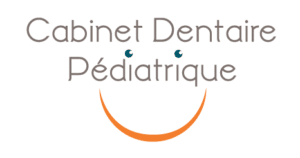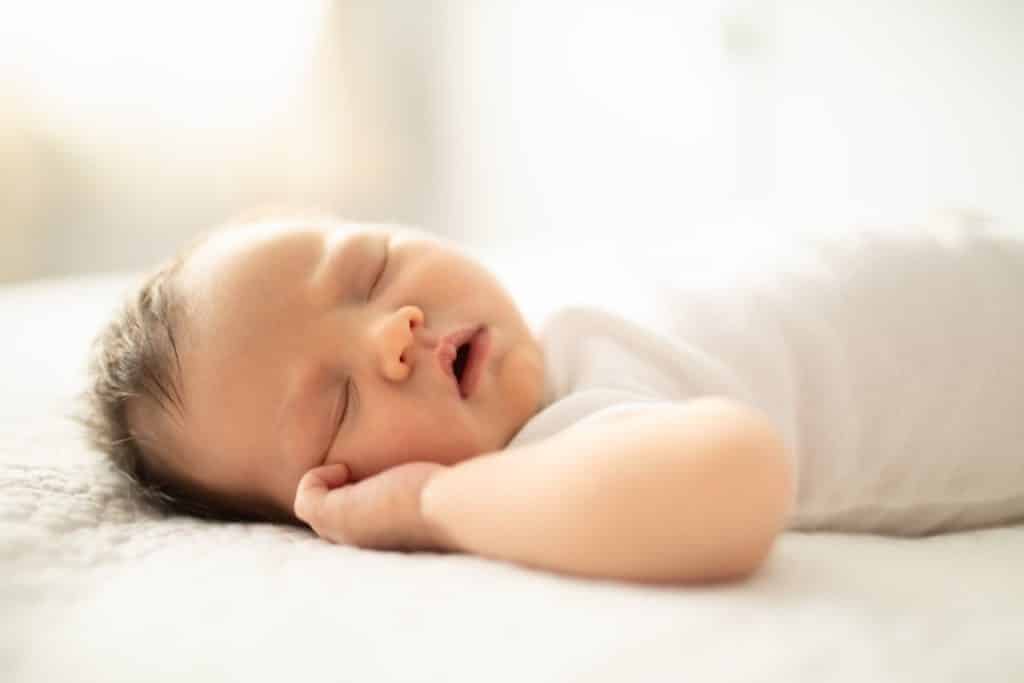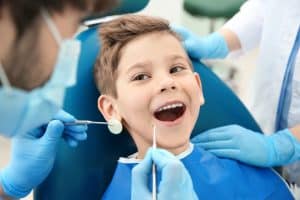Sleep apnea, also known as OSAHS (obstructive sleep apnea-hypopnea syndrome), is a breathing disorder that occurs during the night.
A partial or total obstruction of the airways (nose and throat) causes a respiratory dysfunction. Sleep apnea is mainly manifested by breathing pauses of about ten seconds.
Individuals of all ages can be affected, and babies and children are not spared. It is estimated that approximately 2 to 4% of children suffer from sleep apnea.
Sleep apnea in babies mainly affects premature babies. In children, it usually occurs between the ages of 2 and 8, and between 12 and 16 in adolescents.
Recognizing sleep apnea in children
Wondering if your child has sleep apnea? These few symptoms may give you a clue.
Nocturnal symptoms of sleep apnea
Difficulty breathing during the night is the main symptom of sleep apnea in children. It can be manifested by noisy breathing, snoring, pauses in breathing with signs of struggle or sleeping with the mouth open.
Restless sleep is also a good indicator of sleep apnea in babies and children. This often results in:
- Nightmares or night terrors
- Difficulty getting a full night's sleep
- A difficult awakening
- Excessive sweating
- Abnormal sleep position: head back, sitting, etc.
Snoring can be a good indicator of breathing problems when accompanied by other symptoms. However, it does not always mean that the child has sleep apnea.
Daytime symptoms of sleep apnea in children
Nocturnal breathing problems will directly impact the child's behavior and growth.
During the day, the appearance of other symptoms can help you identify the presence of sleep apnea in your child:
- Breathing mainly through the mouth
- Headaches (especially upon waking)
- Fatigue
- Dark circles
- Behavioral changes: hyperactivity, mood swings, difficulty concentrating, etc.
Is sleep apnea in babies or children dangerous?
Undiagnosed or untreated sleep apnea in infants and children can lead to more serious health problems (cardiovascular problems), as well as social and academic difficulties.
Sleep apnea in babies and children directly affects their breathing and growth, and is therefore potentially dangerous.
Causes and treatments of sleep apnea
Swelling of the vegetations
The most common cause of sleep apnea in babies and children is swollen adenoids or tonsils. These soft tissues, located in the nose and throat, become enlarged to the point that they block the airway and interfere with breathing.
In this situation, an ENT specialist should be consulted to treat the cause of the problem. In some cases, the tonsils may have to be removed.
Premature babies
Premature babies are more likely than others to suffer from sleep apnea. Especially those born before 8 months of pregnancy, the anatomy of babies is not as developed as it should be. The nose, neck and throat are narrower than normal, making it difficult for air to pass through for breathing, which can lead to sleep apnea.
Incorrect maxillofacial positioning
If your child suffered from sleep apnea as a baby, it may have affected the growth of the jaw and teeth. For example, breathing with the mouth open can lead to poor positioning of the teeth or tongue.
In these cases, rehabilitation or orthodontics are recommended to correct dental problems related to sleep apnea.
Other possible causes
There are other less common causes of sleep apnea:
- Allergies
- Being overweight or obese
- Asthma
- Heredity
- Neuromuscular diseases.
If after reading this article you still think that your baby or child is prone to sleep apnea, contact your pediatrician. After examination and if the diagnosis is confirmed, your pediatrician will direct you to the specialist(s) you need to consult to treat the cause of the problem:
- ENT
- Orthodontist
- Pedodontist
- Allergist
- Respirologist
- Etc.
Did your child suffer from sleep apnea as a baby? It is possible that his maxillofacial growth was affected. In order to verify the correct positioning of his jaw, teeth and tongue, do not hesitate to consult a pedodontist.
Specialized in pediatric dentistry and orthodontics, Dr. Adriana Agachi is at your disposal to perform an oral examination. Located in Paris, the office welcomes you in a warm, playful and caring environment. For any information request or to make an appointment, do not hesitate to contact us.
Frequently asked questions about sleep apnea in babies
The danger is not immediate but not treating sleep apnea can be dangerous in the medium and long term by directly affecting the development of the child.
Consult your child's pediatrician or physician first. After determining the cause of the apnea, he or she will refer you to a specialist who can help you solve the problem.


